The Rise of India’s Common Man Party (AAP) Could Prevent Religious Strife
Those of us who have been tracking the anti–corruption movement, out of which the Aam Aadmi Party (AAP or Common Man Party) was born, have been relieved to witness the spectacular electoral rise of this new party. It has won 67 out of 70 seats in the assembly elections. This victory is crucial for several reasons. For those who do not know, here are some somber facts. On December 1, 2014, Saint Sebastian’s Church in Dilshad Garden of East Delhi was burned; on January 3, 2015 the Church of Resurrection, which is located in Rohini in outer Delhi, was attacked; on February 1, 2015 the Saint Alphonsa’s Church was vandalized; on January 15, 2015 another church was attacked in Vikashpuri in Delhi; and a week later Our Lady of Fatima Forane Church Jasola, which is located near Okhla, south Delhi, was attacked. On November 4, 2014 a mahapanchayat (a sort of meeting of people) was called in Bawana, in Delhi. It was widely reported in some sections of the press that attempts were made by both Bharatiya Janata Party (BJP) and Congress Party members to incite the crowds against Muslims. And then magically the very next day, on November 5, 2014, a slaughtered pig was found inside a mosque in Okhla, south Delhi, a predominantly Muslim-populated area. Those who have read the partition-related literature of India–Pakistan would know well that this is a classic way to abet a riot: the formula is to throw a slaughtered pig in a mosque or a slaughtered cow in a temple. The AAP’s electoral victory, at least for the time being, should put an end to these disturbing incidents. And this is further proof that secularism is an issue that cannot be compromised by any party that seeks to govern India.
Here is how the BJP and, in part, Congress have prepared the grounds for the elections. The BJP openly tried to implement its old time-tested formula of fomenting communal riots just before the ballot, so that they could apportion the electoral benefits. Congress did the same but in a more subtle way. These are not stray incidents that can be brushed aside, and one has to understand the larger political context within which they function. Modi’s dream project of neoliberalism cannot be pushed through unless people’s attention is diverted. Even as I write this the RSS chief Mohan Bhagwat has emphatically declared that the final goal of the Right wing is: “Ek bhasha, ek devta, ek sampraday banana hoga” (We have to establish one language, one God and one religion). In a diverse country like India, such statements can at best be treated as patent proof of megalomania. This election, more than anything, proves that India is not a Hindu nation. It is a country whose constitution and civil society are committed to uphold the principle that “all religions are equal.”
In the days that follow the Common Man Party’s victory, one knows that enthusiastic political commentators will predict that “Delhi would become a zero-corruption zone.” The stated reason is, of course, now that AAP has a majority they will easily pass the anti–corruption bill that was tabled last time and had failed to pass. Legislation is, without a doubt, an important tool. It is a reflection of the state and society. It allows us to put in place those enabling institutions that help us to achieve our aims and objectives. Too much faith in this, however, is the expression of a British positivism that is part of our colonial legacy. Without a doubt, AAP has taken a significant step to untangle political parties from corporations. The AAP leaders are some of the most sincere and honest politicians that India has seen in decades. Can good intentions alone bring an end to corruption? What about the deep structural inequality and powerlessness that is a marked feature of life in India? How can one fight corruption in a society where the only way to live comfortably is to rob the poor? These are some of the most important questions that need to be addressed.
Two decades of privatization and economic looting have created a peculiar situation today in India. While wealth is accumulating at one end, poverty and hopelessness are accumulating at the other. There is anger in the heart of people who find themselves between the devil and deep blue sea during each election. But, after all this jubilation over victory settles, how will the party fulfill the rising expectations from it? How will it satisfy a predominantly impoverished population? Will it try to eradicate poverty with mere words, slogans and political metaphors like others do in India? Will the AAP, like the other parties, continue to offer promises of impending Swaraj (self rule) like others have done before them? Or do they have the guts and courage to implement the best of Gandhi’s legacy: public housing, education, healthcare projects, control of the community over its natural resources and complete liquidation of Communal–Fascist forces? Will the AAP, like the others, merely use Gandhi’s image to garner votes or will it move beyond this?
There are several important lessons for the Left, the chief one among them being that it is high time the Left sheds its old, scholastic language. If we are serious about creating a new society, then we must first invent a new discourse of words and metaphors that reflects who we are and what we want to be. It is not that the issues raised by the Left have become irrelevant. With the penetration of global capitalism, the economic divide will only worsen in India. Slavery wages will tighten like a noose around people’s necks. The Left needs to reinvent its political discourse. Gone are the days, when one could settle serious questions by needless quotations from Marxist classics. Marx is our guide, our philosophical treasure, but our success will depend on how far we have been able to Indianize Marx. Our survival depends on how successfully we will transplant the essence of Marxism into our constitutional principles, into the policies that directly affect our day-to-day lives. In short, it is high time we nationalize our dreams and draft our own blueprint of what a just and fair India should be.
I’d like to share a small anecdote that I came across while reading Tolstoy’s The Kingdom of God and Peace Essays. He quotes a story by Hans Christian Andersen. It is a fairly simple story, but one that is highly instructive. A hypocritical King has succumbed to a life of pleasure. He is, as all kings are, surrounded by equally corrupt court aristocrats. The King roams about naked, but no one dares to tell him this. Then, one fine day a child shouts and proclaims “But he doesn’t have anything on!” This, of course, meant that one could no longer pretend that the King roamed about wearing attire. AAP’s political experiment about not accepting funding from corporate interests is exactly like this. Every political outfit, including on the Left, knew that corporations do not give money for free. Yet, everyone pretended that everything was normal, until one political party had the vision to say a polite no to corporate funding. If the Left does not take this lesson home, the time is not far when the only place where one can find leftists will be in the history books or, worse, in the jails. Those in the labor movement should understand that there is nothing inevitable about the Left coming to power just because of an economic meltdown: at best, this is wishful thinking. The despair, if not articulated intelligently and creatively, may just as well give rise to fascism or in some cases to some wooly version of the Left.
Another significant lesson that the Left can learn is to start holding Moholla Sabhas (local meetings) of the people. It should go ahead and give them constitutional status, thereby engineering serious trickling down of democratic power. It is high time that the Stalinist project, where groups of the political elite make decisions for millions of people, be stopped.
Those from the Far-Left who routinely denounce electoral politics, by calling it an act of manufacturing consent, should pause and think. The power of the electoral ballot, with all its flaws, is still the only rational route to capture the political imagination. If the Left can learn its lessons, then it must get back to its own basics: launch a massive information campaign against an economic system that places profit and domination of the other at the heart of its thoughts. There is no reason why the Left should despair. If the Common Man Party, with its moderate attack on crony capitalism can garner such massive public sympathy, then the Left can surely do better. This election, more than ever, asserts to the powers that be that people’s power is something that full front-page advertisement cannot buy. Corporate funds, hooliganism and communal rioting may temporarily establish their sway over people, but finally people’s power will triumph.
Editor’s Notes: Photographs one and nine from the UN Women Asia & the Pacific archive; two, four and six by Joe Athialy; and three, five, seven and eight by Francois de Caillet.
Related Articles


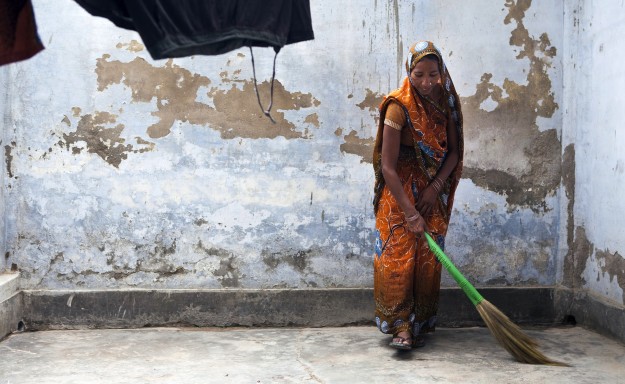
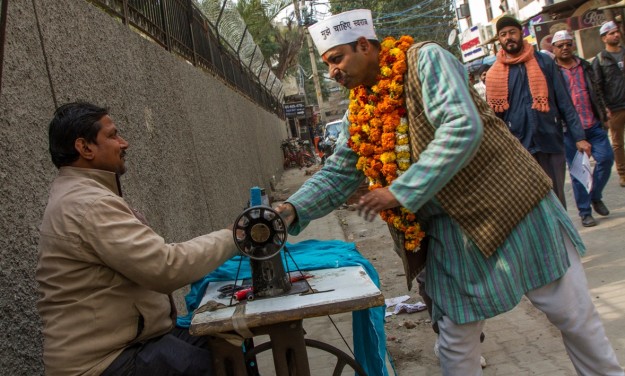
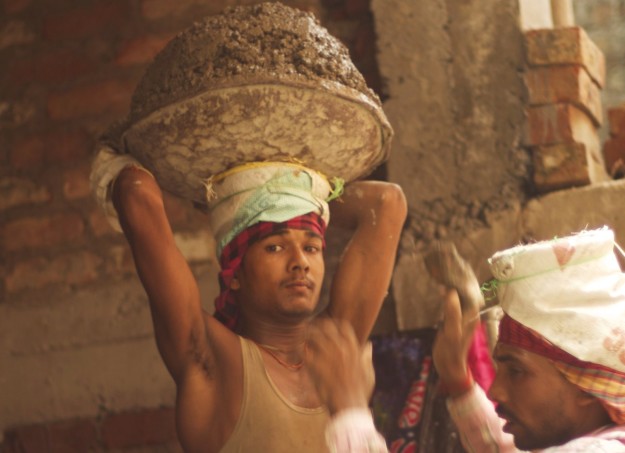
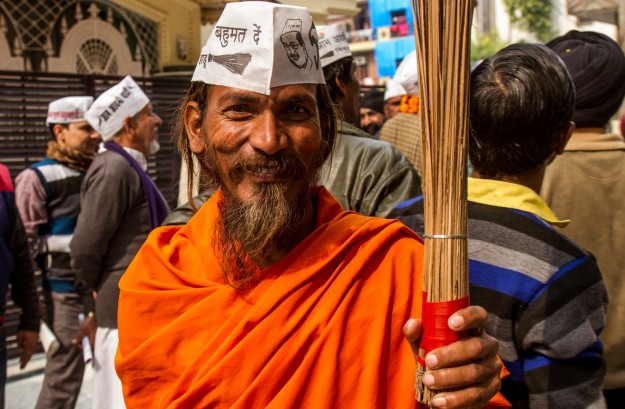
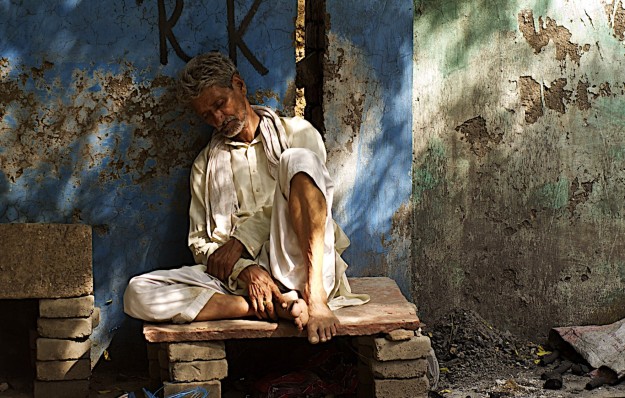
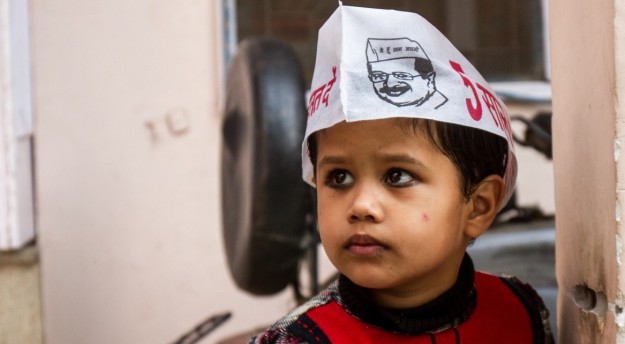
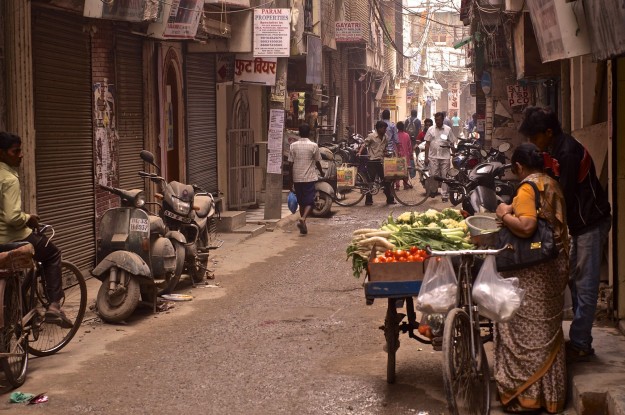
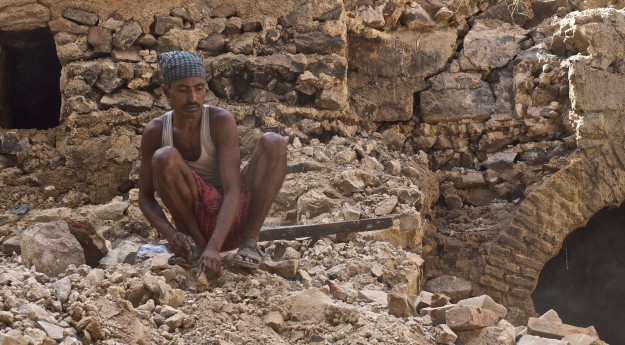
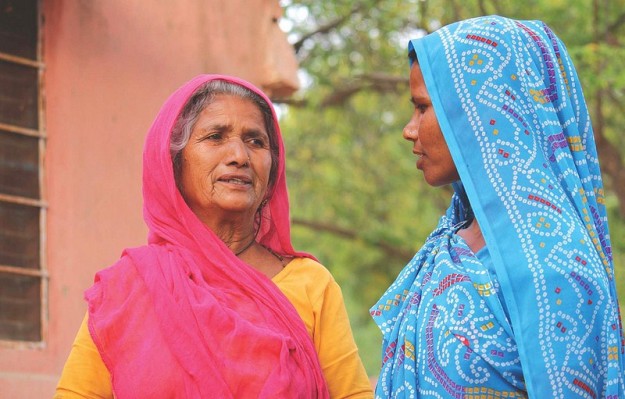











One Response to The Rise of India’s Common Man Party (AAP) Could Prevent Religious Strife
You must be logged in to post a comment Login